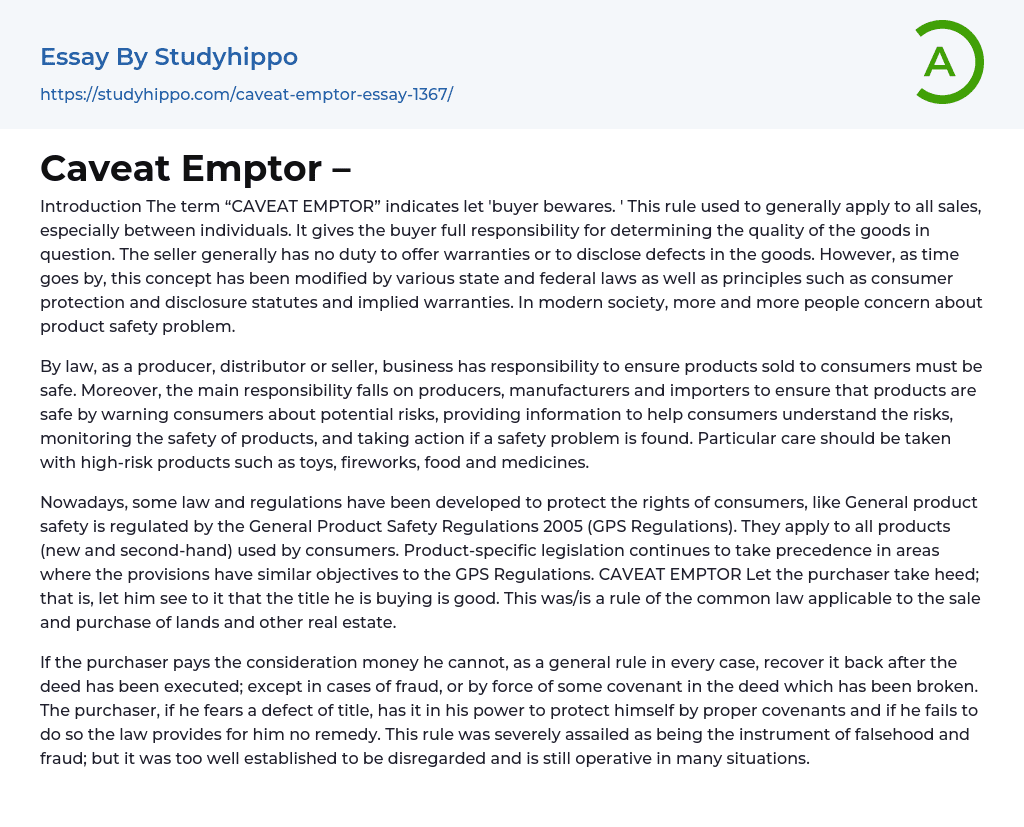Introduction The term “CAVEAT EMPTOR” indicates let 'buyer bewares. ' This rule used to generally apply to all sales, especially between individuals. It gives the buyer full responsibility for determining the quality of the goods in question. The seller generally has no duty to offer warranties or to disclose defects in the goods. However, as time goes by, this concept has been modified by various state and federal laws as well as principles such as consumer protection and disclosure statutes and implied warranties. In modern society, more and more people concern about product safety problem.
By law, as a producer, distributor or seller, business has responsibility to ensure products sold to consumers must be safe. Moreover, the main responsibility falls on producers, manufacturers and importers to ensure that products are safe by warning consumers about potential risks,
...providing information to help consumers understand the risks, monitoring the safety of products, and taking action if a safety problem is found. Particular care should be taken with high-risk products such as toys, fireworks, food and medicines.
Nowadays, some law and regulations have been developed to protect the rights of consumers, like General product safety is regulated by the General Product Safety Regulations 2005 (GPS Regulations). They apply to all products (new and second-hand) used by consumers. Product-specific legislation continues to take precedence in areas where the provisions have similar objectives to the GPS Regulations. CAVEAT EMPTOR Let the purchaser take heed; that is, let him see to it that the title he is buying is good. This was/is a rule of the common law applicable to the sale and purchase of lands and other real estate.
If the purchaser pays
the consideration money he cannot, as a general rule in every case, recover it back after the deed has been executed; except in cases of fraud, or by force of some covenant in the deed which has been broken. The purchaser, if he fears a defect of title, has it in his power to protect himself by proper covenants and if he fails to do so the law provides for him no remedy. This rule was severely assailed as being the instrument of falsehood and fraud; but it was too well established to be disregarded and is still operative in many situations.
- Futures Contract essays
- Mortgage Loan essays
- Renting essays
- Transaction Cost essays
- Jurisprudence essays
- Social Injustice essays
- Juvenile Justice essays
- Buying Homes essays
- Agreement essays
- Business Law essays
- Common Law essays
- Community Policing essays
- Constitution essays
- Consumer Protection essays
- Contract essays
- Contract Law essays
- Copyright Infringement essays
- Court essays
- Crime essays
- Criminal Law essays
- Employment Law essays
- Family Law essays
- Injustice essays
- Judge essays
- Jury essays
- Justice essays
- Lawsuit essays
- Lawyer essays
- Marijuana Legalization essays
- Ownership essays
- Police essays
- Property essays
- Protection essays
- Security essays
- Tort Law essays
- Treaty essays
- United States Constitution essays
- War on Drugs essays




